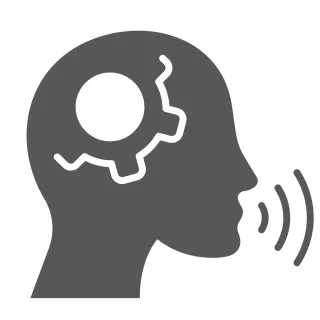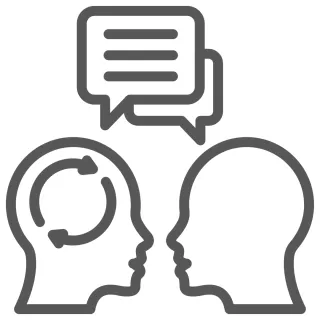Speech & Language Pathology
encompasses a range of services and therapies designed to support and enhance effective communication,
including the evaluation and treatment of speech disorders, language development, voice disorders,
and communication challenges.
Receptive & Expressive Language
Language is in a perpetual state of evolution and stands as a fundamental element of our human identity. It is an indispensable tool in our daily lives, enabling active and meaningful engagement in various contexts. Language, is a complex construct, but can be simplistically categorized into two key components: receptive and expressive language.
Receptive Language refers to the capacity to comprehend and interpret spoken and written language. It involves the ability to understand and process information conveyed through verbal communication, written text, and other forms of expression. This encompasses a range of skills, including listening comprehension, reading comprehension, and interpreting non-verbal cues.
Expressive Language on the other hand, involves the ability to effectively convey thoughts, feelings, and ideas using spoken or written language. It encompasses vocabulary knowledge, grammatical structure, and the ability to formulate coherent sentences and narratives. Expressive language skills enable individuals to articulate their thoughts clearly and convey information to others. Expressive language is expressed utilising each person's own primary mode of communication, which may encompass speech, writing, or the use of Augmentative and Alternative Communication (AAC) tools and devices.
Language development typically follows a predetermined pattern throughout our lives, yet it can be influenced or impeded by factors such as illness (e.g., stroke) or neurodiverse diagnoses (e.g., Autism Spectrum Disorder).

Literacy Skills
Literacy skills encompass the ability to read, write, and comprehend written language effectively. Pre-literacy skills lay the foundation for literacy development and include concepts such as print awareness, phonological awareness, and oral language skills. These foundational skills prepare individuals for formal reading and writing instruction and play a crucial role in future literacy acquisition.
Once individuals begin formal literacy learning, they acquire essential skills such as decoding, fluency, vocabulary development, and comprehension. Proficiency in these areas enables individuals to access and understand written texts, communicate effectively through writing, and engage with various forms of written communication in academic, professional, and personal contexts.
Pre-literacy skills, vital for future reading and writing proficiency, begin developing before formal education commences. These fundamental skills, often known as pre-literacy skills, serve as the foundational building blocks for strong literacy. Children who haven't had the opportunity to cultivate these skills or those who experience challenges in articulating their speech sounds may encounter difficulties when learning to read and write. In such cases, additional support may be necessary.
Additionally, literacy skill challenges can sometimes remain hidden during the early school years and may only become evident when the curriculum intensifies in later grades. Delayed identification can result in various challenges for students, impacting their educational journey. Therefore, it is crucial to promptly address these issues, providing necessary support, and implementing changes to enhance overall outcomes in both early and later schooling years.

Social Skills & Language
The cultivation of positive social skills is a foundation for lifelong success, enabling individuals to engage meaningfully within their essential support networks, like their home environment, and within broader communities.
Social skills are the set of behaviours, communication abilities, and interpersonal strategies that enable individuals to interact effectively with others and navigate social situations. These skills encompass a wide range of abilities, including verbal and non-verbal communication, perspective-taking, conflict resolution, and empathy. Proficient social skills are essential for building and maintaining relationships, collaborating with others, and functioning successfully in social environments.
Language plays a crucial role in social interaction, serving as the primary means of communication and expression. Effective language skills enable individuals to convey their thoughts, emotions, and intentions clearly and to understand and respond appropriately to the communication of others. Language skills are integral to social development, as they facilitate social interaction, cooperation, and the establishment of social connections.
The development of social skills can be affected by a variety of factors including the environment one is raised in, as well as the presence of a neurodiverse diagnosis such as Autism Spectrum Disorder, Attention Deficit Hyperactive Disorder, or Down Syndrome. For individuals diagnosed with these conditions, ongoing support remains invaluable as they adapt to diverse environments, including educational institutions, homes, and workplaces. Additionally, instances like sudden-onset illnesses, such as a stroke, can disrupt previously acquired social skills. In these cases, dedicated support is essential for the restoration of lost abilities.
It's important to acknowledge that social skills and language skills are often closely linked. Therefore, targeting social skills should encompass both of these aspects while recognizing the unique qualities of each individual.

Articulation & Fluency
Speech sounds are created when we use our articulators (tongue, teeth, lips) to shape airflow from the lungs through the mouth and nose. Children typically follow a pattern of speech sound development in their early years, gradually improving clarity and mastering different sounds at specific age ranges. However, some children may encounter difficulties in this process, leading to challenges in articulation and fluency.
Articulation refers to the ability to produce speech sounds accurately and clearly. When a child struggles with articulation, their speech may be difficult to understand, affecting their ability to communicate effectively with others. As Speech Pathologists, we assess articulation skills by examining the production of individual sounds in various word positions and contexts. Through targeted interventions, we help children improve their articulation abilities, providing them with the tools and strategies they need to communicate confidently. If speech development milestones aren't met within the age expected range, or are inconsistent or non-typical, a speech disorder may be present.
Fluency pertains to the smoothness and rhythm of speech. While it is normal for individuals to experience occasional disruptions in their speech, such as pauses or repetitions, persistent fluency difficulties can indicate a fluency disorder. The most well known of these would be stuttering which affects fluency and ease of speech, both for the talker and the listener. Stuttering can have a significant impact on an individual's confidence and social interactions, leading to feelings of frustration and self-consciousness. Although stuttering has genetic markers, it can generally be treated and managed in early years and even later in life.
Early intervention is key in addressing articulation and fluency challenges, as it can prevent these difficulties from persisting into adulthood. By providing evidence-based therapy techniques and support, we empower individuals to improve their speech clarity and fluency, enabling them to communicate effectively and confidently in all aspects of their lives.
Additionally, it's essential to recognise that articulation and fluency difficulties can co-occur with other speech and language disorders, such as language delays or disorders. Therefore, comprehensive assessment and treatment plans are tailored to address each individual's unique needs, fostering optimal communication skills and overall well-being.

Swallowing & Feeding
Swallowing and feeding are fundamental aspects of human function, integral to our ability to sustain life and thrive. Speech pathologists, play a crucial role in assessing and addressing challenges related to swallowing and feeding, ensuring optimal function and well-being for our clients.
Swallowing encompasses a complex series of coordinated movements that allow food and liquids to pass safely from the mouth to the stomach. Any disruption in this process, whether due to neurological conditions, structural abnormalities, or other factors, can lead to difficulties such as aspiration, choking, or malnutrition. Our expertise enables us to evaluate swallowing function comprehensively, identifying any impairments and implementing targeted interventions to improve safety and efficiency.
Feeding involves not only the physical act of ingesting food but also the broader aspects of mealtime participation and nutrition. For individuals with conditions affecting oral motor function, sensory processing, or behavioral factors, feeding difficulties can significantly impact their quality of life. Through our specialized knowledge and skills, we collaborate with clients and their families to develop customized feeding plans, incorporating strategies to enhance oral motor coordination, sensory experiences, and mealtime routines.
Our dedication to promoting safe and enjoyable swallowing and feeding experiences underscores our commitment to supporting holistic well-being and independence for individuals across the lifespan.

All Speech Pathologist's at inspiAH® are registered as Members (MSPA), and, Certified Practising Speech Pathologist's (CPSP) of Speech Pathology Australia. This means we are actively engaged in activities of Speech Pathology Practice to meet the certification requirements of this status.

We currently provide mobile assessment and therapy sessions delivered in your school/preschool, home, and community on the NSW Central Coast.
We also provide Telehealth sessions Nationally.

inspiAH® is the registered trademark of Inspire Allied Health Group Pty Ltd
ABN: 99 657 633 120